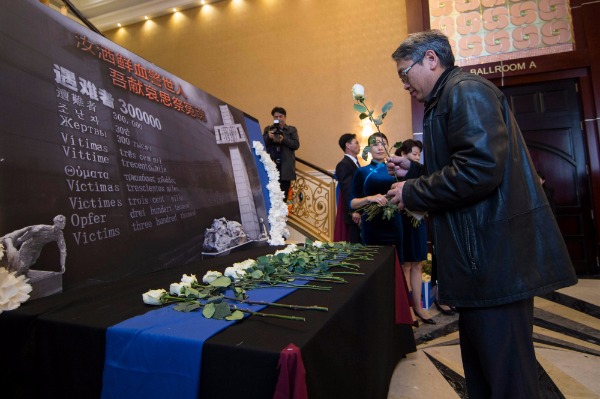Ontario marks Nanjing Massacre
By Na Li | China Daily | Updated: 2017-12-11 08:00

Ontarians from all walks of life marked the 80th anniversary of the Nanjing Massacre at a gathering in Toronto with a call for measures to prevent so atrocious a human tragedy from ever happening again.
Leading the call was Ontario provincial parliament member Soo Wong, who had proposed last month the motion to designate Dec 13 as Nanjing Massacre Commemorative Day in the province.
Wong said as Ontarians remembered the victims of invading Japanese troops on Dec 13, 1937, she wanted to thank the 80th anniversary Nanjing Massacre Commemoration Preparation Committee for its unwavering efforts to remind the world of the atrocities.
The Japanese army bombed Nanjing and went on a murderous rampage through the city, then China's capital, killing Chinese residents and disarming soldiers in the following six weeks.
Lin Xingyong, one of the organizers and president of the Confederation of Toronto Chinese Canadian Organizations, said, "The Nanjing Massacre is a great sorrow and shame not only to Chinese people but also to all humanity".
Provincial parliament member Raymond Cho recalled that World War II had affected him as a child in South Korea.
"The Nanjing Massacre was a mass murder of Nanjing civilians and unarmed soldiers that happened in late 1937 to early 1938. And this fact, unfortunately, hasn't been told to the young generation; it's very dangerous," Cho said.
MP Shaun Chen said younger generations must learn about the massacre.
"It's our duty to teach our future generations the actual facts of this important history. We all need to work very hard so that there is never again another Holocaust and massacre on this planet," Chen said.
Toronto Mayor John Tory said, "We grieved for those who suffered and lost their lives and their families and think about the things we have to do to ensure an event like this never happens again."
"The Nanjing Massacre has a profound impact on later generations, even 80 years later," he said.
Chinese Consul General He Wei said society's moral obligation doesn't stop at having the commemorative day.
"Remembrance is our duty out of a mission to protect each and every human life and to protect everyone's freedom and equal rights. Today we gathered together to commemorate this history, and I believe it will create new views and enhancement to promote mutual understanding and respect between different ethnic, religious and cultural communities."
The commemoration was not meant to prolong hatred, He said, but to help people draw lessons from history and consolidate their commitment to peace and a solid foundation for lasting peace in the world.
























